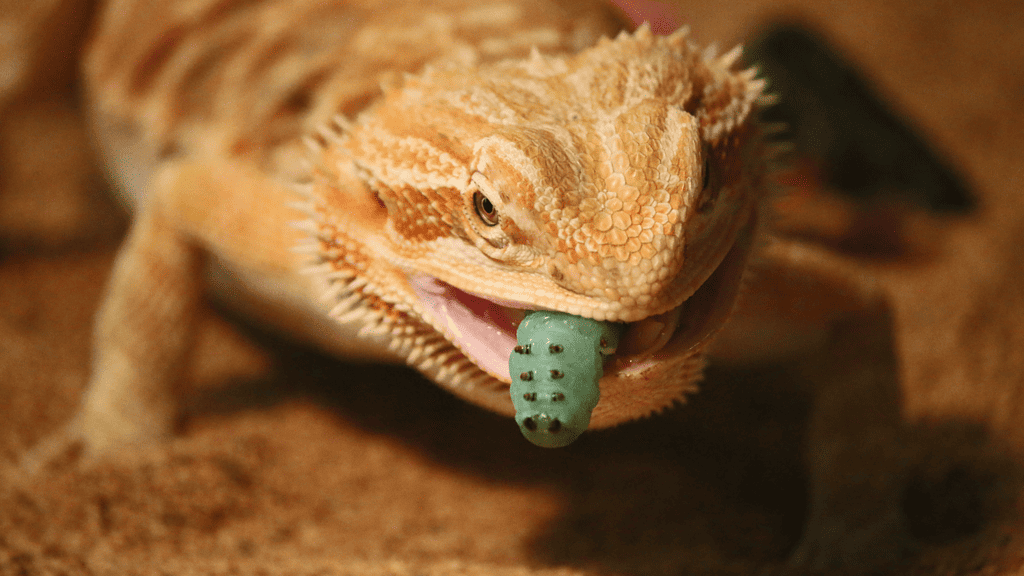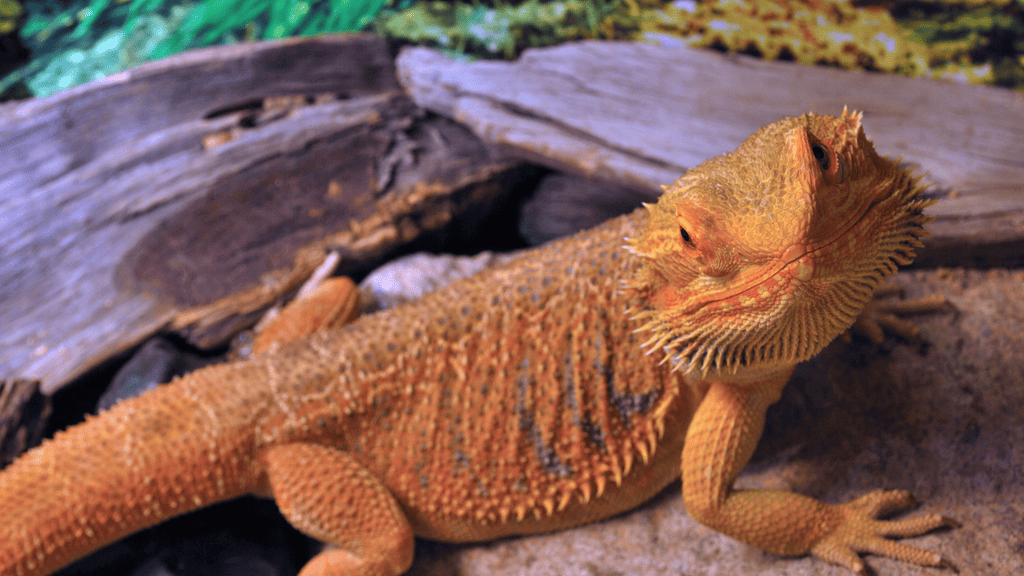Bearded dragons originated in Australia and are popular pets because of their friendly nature and unique appearance. In addition to its beard, which shows how the reptile is feeling, its behavior and excretion can tell you many other things. The question is, do bearded dragons poop?

Bearded dragons do, in fact, poop every day, and sometimes even many times in a single day. Bearded dragons, on the other hand, are known to be capable of going seven days without pooping. If it has been more than a week since your bearded dragon defecates, it could indicate that it is becoming impacted.
This article will provide you with all of the information that you require regarding bearded dragon poop.
What Does Normal Bearded Dragon Poop Look Like?
To determine whether your beardie is healthy, you need to be familiar with the characteristics of healthy poop produced by beardies. The waste produced by a bearded dragon in good health is a mixture of two distinct types.
The first portion is solid, brownish dietary wastes, and the second is pale soft, firm urine. Your bearded dragon’s diet will be evident in the consistency of its waste products. In most cases, it should not be very watery; otherwise, there may be a problem. Bearded dragon poop will darken and become more solid if you feed it insects.
The bodies of bearded dragons are designed to keep as much water as possible, and the bearded dragons, in turn, discharge their urine as solid waste while keeping the fluid in their bodies.
What Does Bearded Dragon Poop Mean?
Bearded dragons may produce several distinct types of poo, and each can tell you something unique about the beardie that produced it. An explanation of what each kind of poop indicates is provided below.
Yellow Poop
If you give your bearded dragon food that is heavy in calcium, you might expect it to have yellow faeces rather frequently. It can also make their poo a lot more yellow than it usually is. Reduce the quantity of calcium in their diet in any way you can to prevent the discolouration from continuing. An excessive amount of calcium can harm their vital organs and create even more issues with their bowels.
Brown Poop
Bearded dragons typically have brown poop, indicating that the bearded dragon is in good health. If you come across this form of poo, there is no need for concern.
Runny Poop
If it happens only sometimes, beardie poop that is runny is not something to be concerned about. The presence of runny poop indicates that there has been a change in the food of your dragon, which will often be handled on its own.
You may observe that your bearded dragon has diarrhoea after eating high-fibre food. To resolve this issue, the fibre level of the meals that you feed your bearded dragon should be progressively decreased.
White Poop
Your bearded dragon may suffer from dehydration if it produces white poop, mainly if the faeces are chalky white.
You may prevent your bearded dragon from dehydrating by giving it a bath every three days for ten minutes. The bath makes the scales on your dragon’s skin moister, which rehydrates the beardie.
Black Poop
If your bearded dragon’s waste is black, this may be an indication that it is eating primarily insects and very few, if any, plants. This must be balanced by supplying the bearded dragon with the plant essential to its diet. If you do this and you still notice black faeces, you must carry the poop to the doctor so they can examine it. Your bearded dragon is likely experiencing inactivity, which blocks bowel motions and can result in severe constipation, ulcers, and internal bleeding. This condition is referred to as “inaction.” A parasite infection may be present if the faeces have an unpleasant odour. It is also important to note that the poop left behind by a bearded dragon will turn darker as it dries up.
Green Poop
If your dragon has recently consumed green veggies like spinach, its poop will be green in colour. Your beardie will not have any difficulties as a result of this happening. Like the yellow poop, you must watch your dragon’s diet to find out if its poop is affected by the veggies it ate. If you’re not sure, go to the vet.
How Often Should Bearded Dragons Poop?
On average, a Bearded Dragon should poop from once to seven times weekly. Since it is only natural that a younger beardie would consume more food than an adult, it stands to reason that they will have to go more frequently.
When your bearded dragon gets older, you will probably notice that it does not eat as much, so it does not poop as frequently. You’ll also observe a shift in their eating habits as they tend to move toward a more plant-based diet. Pooping can go down to once a week or less often.
How Often Should Baby Bearded Dragon Poop?
You should predict that your newborn bearded dragon, up to two months old, may poop anywhere from one to three times every day.
Baby beardies’ bodies change quickly because they eat a lot of protein, so don’t worry if your small friend continues to give you a lot of gifts to clean.
Is Bearded Dragon Poop Dangerous?
Although the bearded dragon may be a friendly creature, its poop is not. Salmonella, which may or may not be fatal to the reptile but may be highly hazardous to people, is present in the animal’s faeces. Therefore, even a bearded dragon in excellent health can spread sickness to people. It is very necessary to exercise extreme caution if handling the beardie or cleaning up its waste. It is possible that coming into direct contact with the reptile will not cause an illness, but bringing it too close to vulnerable areas of the body, such as the mouth, can cause an infection. You should wash the excrement with hot water and soap and wash your hands well.
What to Do if The Beardie Poops Too Much?
It might be concerning when a bearded dragon poops excessively. Bearded dragons defecate more often for several reasons. However, an essential step is having your certified veterinarian examine it. When under pressure, bearded dragons tend to poo more regularly.
They are also susceptible to being frightened by unusual persons, unusual noises, or unexpected movements. Therefore, you should analyze their environment to see whether or not these items are causing them stress.
Bearded dragons can also have frequent defecation problems if they eat certain foods, especially insects with tougher shells. Therefore, ensure you only provide your beardies with little bug treats weekly. Bearded dragons need fresh fruits and vegetables, too.
On the other hand, bearded dragons may experience digestive trouble if they eat leafy greens. Therefore, if you feed your beardie greens, you should consider switching to other veggies.
Bearded dragons are not designed to consume large amounts of food. Thus, it is essential to remember that you should give them more food in smaller pieces while feeding them.

Why Does My Bearded Dragon Not Poop?
They will poop less often as they age and produce less waste overall. Therefore, you shouldn’t be worried if you observe an activity decline as they age. But if they just won’t poop, that’s an issue.
This could be because of a health problem or more stress. That’s why, if you see this happening, you need to start keeping a record of their symptoms and actions. If you observe that your bearded dragon has not pooped for an unusually extended time, you should consult your vet and consider their advice.
How Long Can They Go Without Pooping?
Bearded dragons who are not in the brumation state and are otherwise healthy shouldn’t go more than a week without defecating. Some beardies can go for weeks without defecating, but this is highly uncomfortable and typically indicates something wrong with their health.
Bearded dragons typically don’t poo for six basic reasons, which are as follows:
- A bad diet
- Parasites
- Stress
- Brumation
- Impaction
- Lighting
